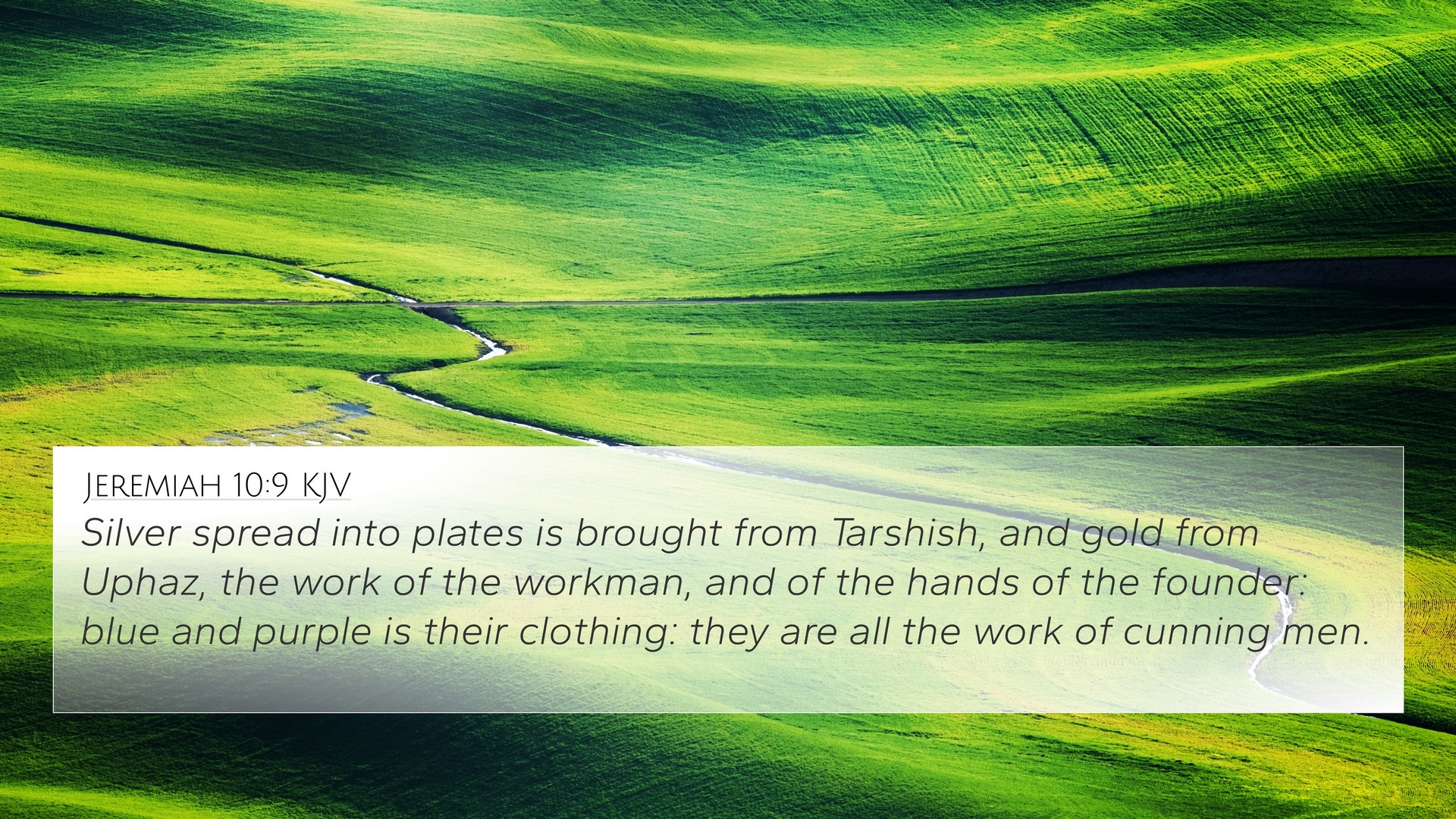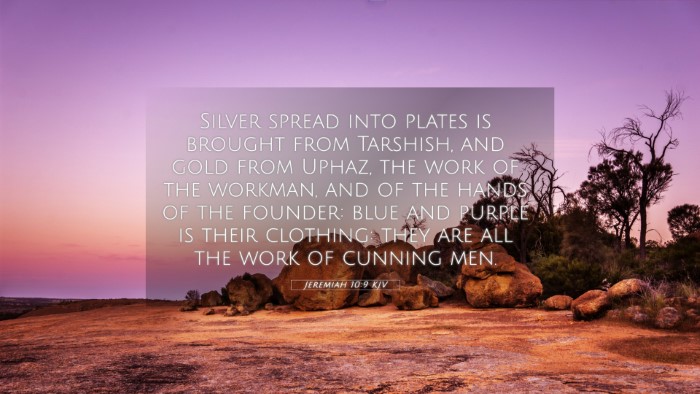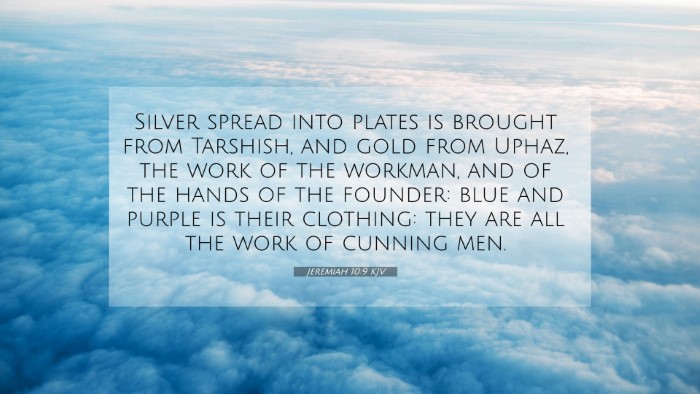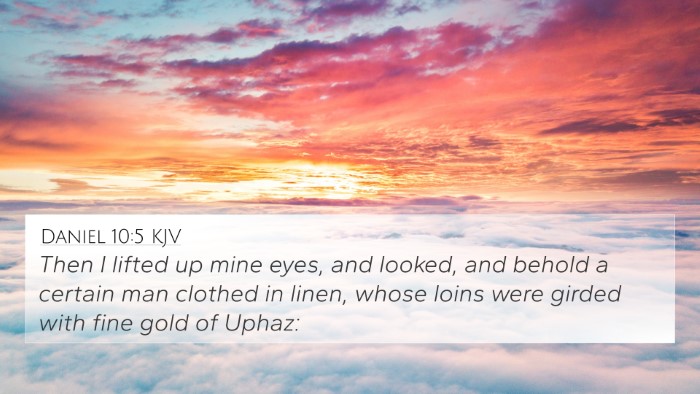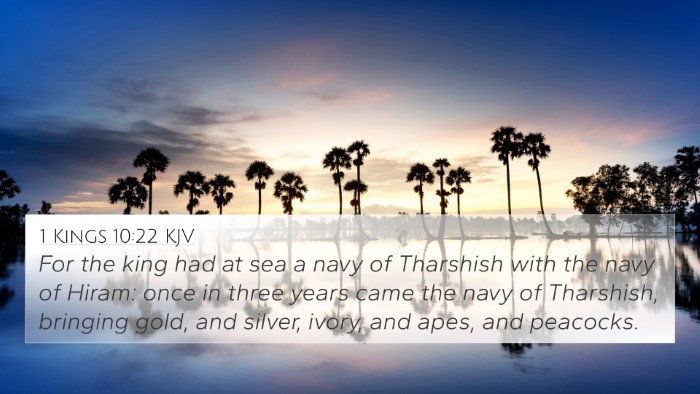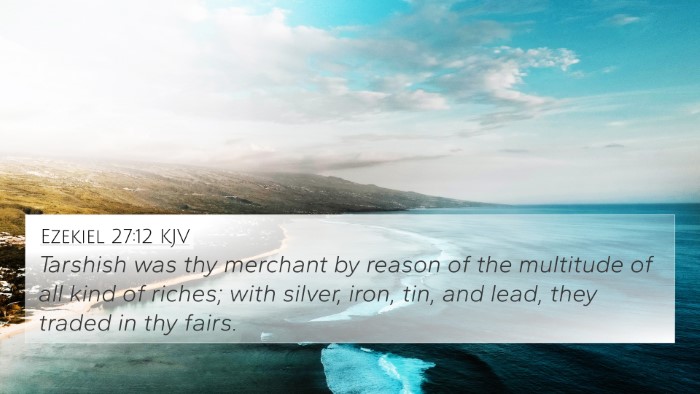Understanding Jeremiah 10:9
Jeremiah 10:9 states:
"Silver spread into plates is brought from Tarshish, and gold from Uphaz, the work of the workman, and of the hands of the founder: blue and purple is their clothing: they are all the work of cunning men."
Summary of the Verse
This verse reflects the contrast between the futile worship of idols and the grandeur of true worship of God. In this passage, Jeremiah speaks about the material wealth used in idolatry, emphasizing the efforts and craftsmanship that goes into creating idols, which ultimately proves to be meaningless compared to the living God.
Commentary Insights
In examining this verse, we draw insights from prominent public domain commentaries:
- Matthew Henry: Henry points out the absurdity of using precious metals and intricate skills to fashion idols. He argues that the magnificence of these idols does not equate to their worth; rather, they divert worship away from God, who deserves all honor and glory.
- Albert Barnes: Barnes expounds that the gold and silver used in the creation of these images demonstrate the misguided priorities of those who worship them. It hints at the elaborate efforts made to create that which cannot save or protect.
- Adam Clarke: Clarke emphasizes the futility and parental deception inherent in idol worship. He reminds readers that despite the beautiful craftsmanship of the idols, they are ultimately powerless, compared to the creative might of God.
Thematic Connections and Cross-References
This verse can be cross-referenced with various other scriptures that illuminate the theme of idolatry and the supremacy of God:
- Isaiah 40:19-20: This scripture reflects on the insignificance of idols, drawing a parallel with the complexities of their creation.
- 1 Corinthians 8:4: Paul discusses the reality of there being no true gods but one, emphasizing the futility of idol worship.
- Psalms 115:4-8: This passage discussing idols reinforces the emptiness of relying on man-made images, just as Jeremiah does.
- Habakkuk 2:18-19: Here, Habakkuk questions the value of idols and their inability to speak or act, paralleling Jeremiah’s message.
- Acts 17:29: Paul speaks on the nature of the divine being incomparable to gold or silver, again affirming the immensity of God.
- Revelation 9:20: This verse illustrates the refusal of humanity to turn from idols, tying back to the ongoing theme of idolatry in Jeremiah.
- Jeremiah 51:17: This passage echoes the futility of trusting in idols that cannot save, directly relating to the warnings in Jeremiah 10.
- Exodus 20:4-5: The commandment against making graven images highlights God's insistence on true worship versus idolatry.
- John 4:24: Jesus teaches that the true worshipers will worship in spirit and truth, confirming the point that true worship transcends physical representations.
- 1 John 5:21: John concludes with a call to keep oneself from idols, tying it back into the heart of Jeremiah's warnings.
Conclusions
From this analysis, we see that Jeremiah 10:9 is more than just a critique of idols; it serves as a reminder of the importance of recognizing the true God amidst the distractions of materialism and false worship. The cross-references help frame a broader understanding of the themes presented in this passage.
Connections Between Biblical Texts
Through cross-referencing Biblical texts, individuals can gain deeper insights into the themes of idolatry, the nature of God, and the authenticity of worship. Such connections illustrate the rich tapestry of scripture where themes and lessons are woven together, reinforcing the message of reliance on the living God.
Tools for Bible Cross-Referencing
To study cross-referencing effectively, consider utilizing:
- Bible concordance: A valuable resource for locating passages and understanding their contexts.
- Bible cross-reference guide: Helpful for identifying related verses within different books of the Bible.
- Cross-reference Bible study: Focused sessions that engage with related scriptures for deeper understanding.
The insights drawn from Jeremiah 10:9 remind us to reflect deeply on our own worship practices. Are we dedicating time and energy to the true God, or are we entangled in the web of idols that lead us away from the living God?
